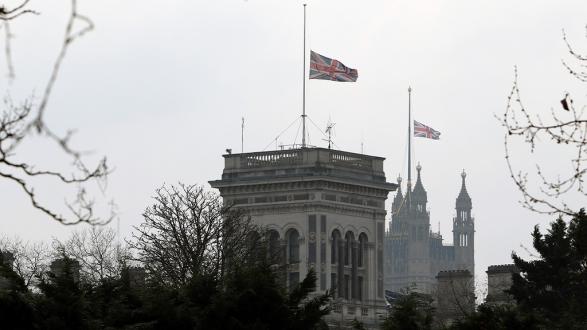In:
Global Beat is your weekly stop for news from around the world. Join us every Friday morning for important stories you should know about.
This week, a terrorist attack in London killed five people and injured at least 40 more; U.S. Secretary of State Rex Tillerson decides to attend a NATO summit he originally planned to skip; the latest North Korea missile launch failed, according to South Korea and the United States; and more.
____________________
Americas
U.S. Secretary of State Rex Tillerson announced this week that he will attend a meeting with NATO foreign ministers next week, after initially planning on skipping it. The State Department said NATO made scheduling changes in order to accommodate him. Tillerson will attend the March 31 event in Brussels, rather than the originally scheduled meetings on April 5-6.
Also check out:
- Brazilian meat scandal leads USDA to redouble food inspection efforts – Jeff Daniels, CNBC
Central & South Asia
Pakistan’s lower house on Tuesday passed legislation to reinstate secret military courts, originally created in response to the 2015 attack on a military-run school by the Pakistani Taliban that killed 132 children. The courts, which try civilians with terrorism charges, have received criticism from human rights groups for lack of press access, private decisions, no right for defendants to appeal a verdict, and for the fact that judges are not required to have law degrees or provide reasoning for their verdicts.
Also check out:
- Apple to start making iPhones in India over next two months – Rajesh Roy and Newley Purnell, The Wall Street Journal
China & East Asia
North Korea launched a missile off its eastern coast on Wednesday, but South Korean and U.S. military officials said the test failed. Commander Dave Benham, a spokesman for the U.S. Pacific Command, said the missile appeared "to have exploded within seconds of launch." This occurred only one day after a North Korean envoy declared the country had no fear of any U.S. effort to broaden sanctions against it. The Trump administration is weighing broad sanctions on North Korea and Secretary of State Rex Tillerson said military action is an option.
Also check out:
- China threatens American bomber after it ‘flies too close to their airspace’ – Rob Waugh, Yahoo News
Europe & Russia
During a terrorist attack in the London City of Westminster on Wednesday, five people, including the assailant and one police officer, were killed and at least 40 injured. The majority of the injuries occurred when a car struck pedestrians on Westminster Bridge, near the Houses of Parliament. The assailant then stabbed a policeman before he was shot by armed officers. The attacker was identified as Khalid Masood, 52, a British citizen. ISIL has claimed responsibility for the attack. Eight arrests have been made in connection with the attack, although police say they still believe Masood acted alone and was inspired by international terrorism.
Also check out:
- Ukraine’s president calls killing of Putin critic a Russian terror act – Victoria Butenko and Jason Hanna, CNN
Middle East & North Africa
Fighting broke out in the northeastern edge of Damascus on Tuesday as Islamist rebel groups and al Qaeda-linked jihadists took control of government strongholds. The attack, the largest on the captial in years, began on Sunday, wounding as many as 15 and shutting down main roads. While the Syrian government seized eastern Aleppo from rebel groups late last year, recent attacks demonstrate the war is far from over.
Also check out:
- Iranian leaks about missing American led Levinson family to sue Iran – Michael Lipin and Parisa Farhadi, Voice of America
Southeast Asia & Oceania
Philippine President Rodrigo Duterte wrapped up a Southeast Asia tour with a three-day visit in Thailand this week where he and Thai Prime Minister Prayut Chan-o-cha agreed to strengthen military ties. They vowed to fortify defense and economic cooperation, reaffirming their commitment to work together to address common concerns such as terrorism, piracy, and human and drug trafficking. President Duterte emphasized the importance of Thailand’s support for the framework of a code of conduct to ensure all parties follow legal and diplomatic processes in settling territorial disputes in the South China Sea, something he hopes to complete as the Philippines chairs the regional meetings of the Association of Southeast Asian Nations (ASEAN) later this year.
Also check out:
- Chinese premier warns Australia ‘taking sides’ on South China Sea could lead to new cold war – Katharine Murphy, The Guardian
Sub-Saharan Africa
A group of opposition politicians, activists, and church leaders protested in the Zimbabwean capital of Harare on Tuesday in anger over what they claim are government attempts to rig next year’s presidential election. Confidence in the Zimbabwe Electoral Commission (ZEC) began to wane when the government of President Robert Mugabe—who has been in power for 30 years and is set to run again—decided to purchase biometric voter registration kits from the United Nations. The opposition is concerned the kits would be prone to manipulation by hostile nations and unsustainable due to the country’s weak internet capacity, in addition to making it easier for President Mugabe’s political party to skew the list of eligible voters in its favor.
Also check out:
- Uganda at ‘breaking point’ as South Sudan refugees pour in – Rodney Muhumuza and Justin Lynch, Associated Press




